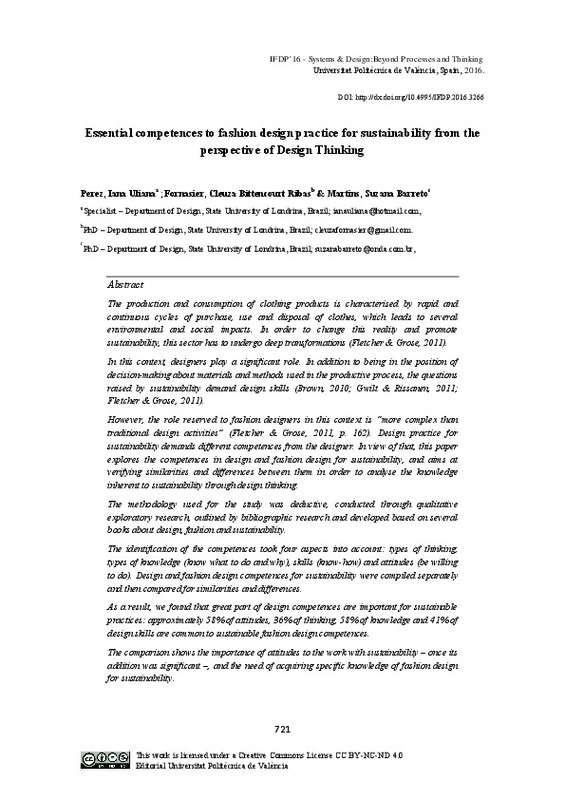JavaScript is disabled for your browser. Some features of this site may not work without it.
Buscar en RiuNet
Listar
Mi cuenta
Estadísticas
Ayuda RiuNet
Admin. UPV
Essential competences to fashion design practice for sustainability from the perspective of Design Thinking
Mostrar el registro sencillo del ítem
Ficheros en el ítem
| dc.contributor.author | Uliana Perez, Iana
|
es_ES |
| dc.contributor.author | Bittencourt Ribas Fornasier, Cleuza
|
es_ES |
| dc.contributor.author | Barreto Martins, Suzana
|
es_ES |
| dc.date.accessioned | 2017-09-20T07:04:46Z | |
| dc.date.available | 2017-09-20T07:04:46Z | |
| dc.date.issued | 2016-10-27 | |
| dc.identifier.isbn | 9788490484401 | |
| dc.identifier.uri | http://hdl.handle.net/10251/87567 | |
| dc.description.abstract | [EN] The production and consumption of clothing products is characterised by rapid and continuous cycles of purchase, use and disposal of clothes, which leads to several environmental and social impacts. In order to change this reality and promote sustainability, this sector has to undergo deep transformations (Fletcher & Grose, 2011). In this context, designers play a significant role. In addition to being in the position of decision-making about materials and methods used in the productive process, the questions raised by sustainability demand design skills (Brown, 2010; Gwilt & Rissanen, 2011; Fletcher & Grose, 2011). However, the role reserved to fashion designers in this context is “more complex than traditional design activities” (Fletcher & Grose, 2011, p. 162). Design practice for sustainability demands different competences from the designer. In view of that, this paper explores the competences in design and fashion design for sustainability, and aims at verifying similarities and differences between them in order to analyse the knowledge inherent to sustainability through design thinking. The methodology used for the study was deductive, conducted through qualitative exploratory research, outlined by bibliographic research and developed based on several books about design, fashion and sustainability. The identification of the competences took four aspects into account: types of thinking, types of knowledge (know what to do and why), skills (know-how) and attitudes (be willing to do). Design and fashion design competences for sustainability were compiled separately and then compared for similarities and differences. As a result, we found that great part of design competences are important for sustainable practices: approximately 58% of attitudes, 36% of thinking, 58% of knowledge and 41% of design skills are common to sustainable fashion design competences. The comparison shows the importance of attitudes to the work with sustainability – once its addition was significant –, and the need of acquiring specific knowledge of fashion design for sustainability. Research also shows that, for a professional with design competence, the development of thinking and skills needed for working with fashion design for sustainability is easier. | es_ES |
| dc.format.extent | 11 | es_ES |
| dc.language | Inglés | es_ES |
| dc.publisher | Editorial Universitat Politècnica de València | es_ES |
| dc.relation.ispartof | Systems&design:beyond processes and thinking | es_ES |
| dc.rights | Reconocimiento - No comercial - Sin obra derivada (by-nc-nd) | es_ES |
| dc.subject | Knowledge management | es_ES |
| dc.subject | Clothing sector | es_ES |
| dc.subject | Design | es_ES |
| dc.subject | Sustainability | es_ES |
| dc.title | Essential competences to fashion design practice for sustainability from the perspective of Design Thinking | es_ES |
| dc.type | Capítulo de libro | es_ES |
| dc.type | Comunicación en congreso | es_ES |
| dc.identifier.doi | 10.4995/IFDP.2015.3266 | |
| dc.rights.accessRights | Abierto | es_ES |
| dc.description.bibliographicCitation | Uliana Perez, I.; Bittencourt Ribas Fornasier, C.; Barreto Martins, S. (2016). Essential competences to fashion design practice for sustainability from the perspective of Design Thinking. En Systems&design:beyond processes and thinking. Editorial Universitat Politècnica de València. 721-731. https://doi.org/10.4995/IFDP.2015.3266 | es_ES |
| dc.description.accrualMethod | OCS | es_ES |
| dc.relation.conferencename | Systems & Design: Beyond Processes and Thinking | es_ES |
| dc.relation.conferencedate | June 22-24,2016 | es_ES |
| dc.relation.conferenceplace | Valencia, Spain | es_ES |
| dc.relation.publisherversion | http://ocs.editorial.upv.es/index.php/IFDP/IFDP/paper/view/3266 | es_ES |
| dc.description.upvformatpinicio | 721 | es_ES |
| dc.description.upvformatpfin | 731 | es_ES |
| dc.type.version | info:eu-repo/semantics/publishedVersion | es_ES |
| dc.relation.pasarela | OCS\3266 | es_ES |








